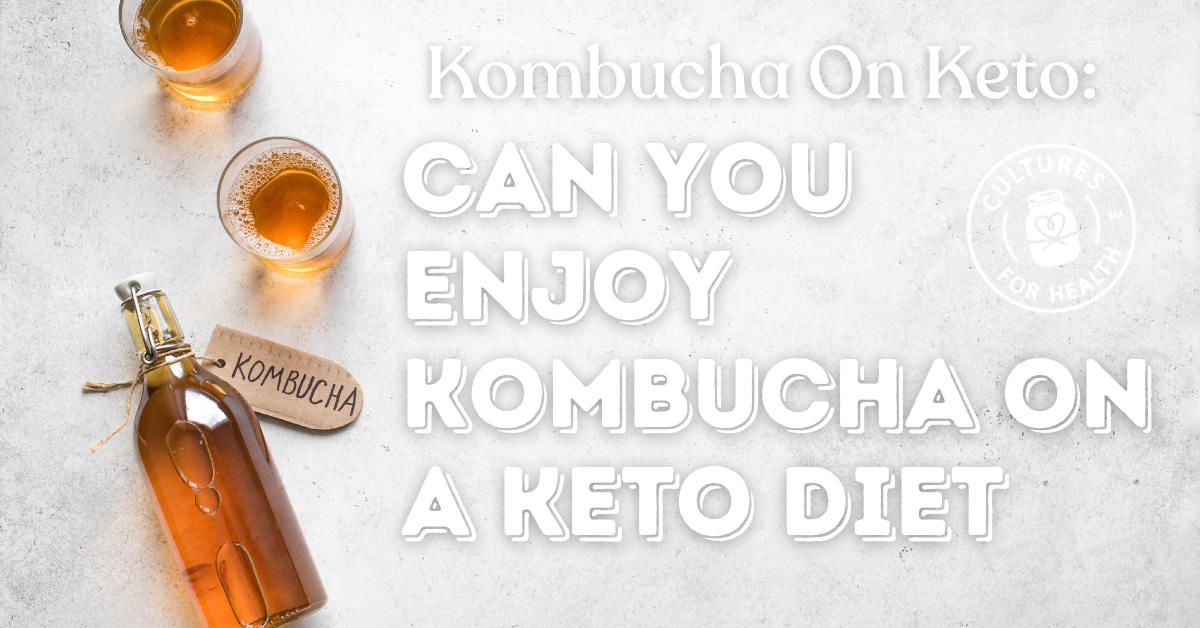
Making kombucha tea requires five simple ingredients: water, tea, sugar, starter tea, and a kombucha starter culture (SCOBY). You have lots of choices for each ingredient, but using the right ingredients for your kombucha creates a healthier environment for the SCOBY.
With hand-picked ingredients and fermentation supplies for reliable results, our kombucha kits were designed to make home kombucha brewing as easy as possible. Just add water to get started.
While it is possible to switch up the tea and sugar you use to change the flavor of your finished kombucha, we recommend you wait until you have a baby SCOBY or two to spare before experimenting with different tea and sugar combinations.
Jump to a Section:
- The Best Water for a Healthy SCOBY
- Types of Tea for Making Kombucha
- Types of Sugar for Making Kombucha
- Starter Tea & Vinegar: What to Use
- The SCOBY
CHOOSING WATER FOR MAKING KOMBUCHA
What To Use
Kombucha cultures best when you use water that is as free from contaminants as possible. High mineral content is not particularly important for kombucha, unlike other fermented beverages. In fact, it may be harmful to the SCOBY if the water has too high a mineral content.
Basic, inexpensive spring water is fine to use, but water that claims to be "mineral water" or has a high mineral content should be avoided if possible.
How to Remove Contaminants
We recommend using filtered water to remove as many additives, chemicals, and contaminants as possible.
If your water contains chloramines, it must be filtered. Removing fluorides also requires special filters. Check your filter instructions to check what contaminants it removes.
If filtering is not possible, at the very least, aerating or boiling the water for 20 minutes may remove the chlorine. Letting the water stand for 24 hours will also allow the chlorine to evaporate.
What to Avoid
Water that is structured, alkalized, or pH-adjusted is not appropriate for making kombucha.
If you are still uncertain about the best source of water for making kombucha, you can learn more about choosing the right water for culturing here.
CHOOSING TEA FOR MAKING KOMBUCHA
Brewing kombucha requires real tea (camellia sinensis) for both minerals and nitrogen.
The type of tea used to brew kombucha can affect the health of the SCOBY as well as the taste of your finished brew. If you're just getting started, we find that plain black tea works best for making kombucha. We also recommend using organic tea whenever possible, to avoid chemical contaminants.
It's best to wait until you have a healthy SCOBY and have made at least 4 batches of kombucha before using some other teas. Follow the guidelines to experiment with flavors AND keep your SCOBY happy and healthy.
If you're worried about how much caffeine is in kombucha, you can make it using decaffeinated tea. (While it was previously believed that most of the caffeine is released in the first few minutes of steeping tea, this idea has proved false.)
CHOOSING SUGAR FOR MAKING KOMBUCHA
While it can be tempting to try to find ways not to use sugar in recipes, sugar is required for the fermentation process and cannot be bypassed or substituted. Using less sugar than required may starve the SCOBY.
Keep in mind that the longer the kombucha is fermented, the less sugar remains. Brew from 7-30 days, tasting along the way, to find the best balance between sugar and flavor.
Sugar |
Description |
Results |
| White cane sugar | Pure white, free of minerals | Good choice for brewing kombucha |
| Organic Cane Juice Crystals | Unbleached white sugar; very low mineral content | CFH best choice for brewing kombucha. |
| Brown, raw, or whole cane sugars | Sugar that is less refined and contains molasses | Hard on the kombucha SCOBY. Produces a yeasty kombucha and may shorten the SCOBY's life. Not recommended. |
| Honey | Natural sugar from bees; may be raw or pasteurized | Results may be inconsistent; If used, always have a backup SCOBY available. |
| Agave, Maple, coconut, palm sugars or syrups | Sugar extracted from various plants or trees | Results may be inconsistent and hard on the SCOBY. Not recommended. |
| Stevia, xylitol, or Artificial Sweeteners | Sugar substitutes | Do not contain nutrients or proper food for the kombucha SCOBY. Not recommended. |
CHOOSING STARTER TEA AND VINEGAR FOR MAKING KOMBUCHA
The addition of an acidic liquid is critical to the health of the SCOBY and the safety of the batch of kombucha. The most desirable acidic liquid to use when brewing a batch of kombucha is properly brewed kombucha tea from a previous batch.
If starter tea is not available, there are two options:
- Use a bottle of store-bought raw, unflavored kombucha tea.
- Use white distilled vinegar. Vinegar can make up all or part of the acidic liquid portion needed to brew a batch of kombucha.
OBTAINING A KOMBUCHA SCOBY
A healthy kombucha SCOBY is important to making a good batch of kombucha tea. If you do not have a healthy SCOBY, try our Kombucha Starter or check our information on obtaining or growing a kombucha SCOBY.
WHAT'S NEXT?
Now that you know more about the ingredients for making kombucha, it's time to start making your own! Lucky for you - Cultures for Health has everything you need to make kombucha.
We have the best collection of kombucha products including, kombucha starters, all-in-one kits, flavor kits, and all of the tools you'll need to start your SCOBY at home.
The easiest way to jump into the fermentation world is our Kombucha Starter Kit that has our starter culture (SCOBY), plus hand-picked ingredients & supplies to get you started with making your own kombucha.
Click here to check out our Kombucha Starter Kit now
Ready to Learn More?














